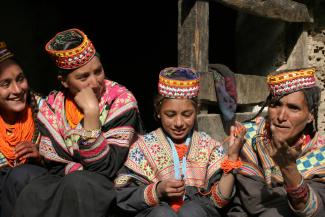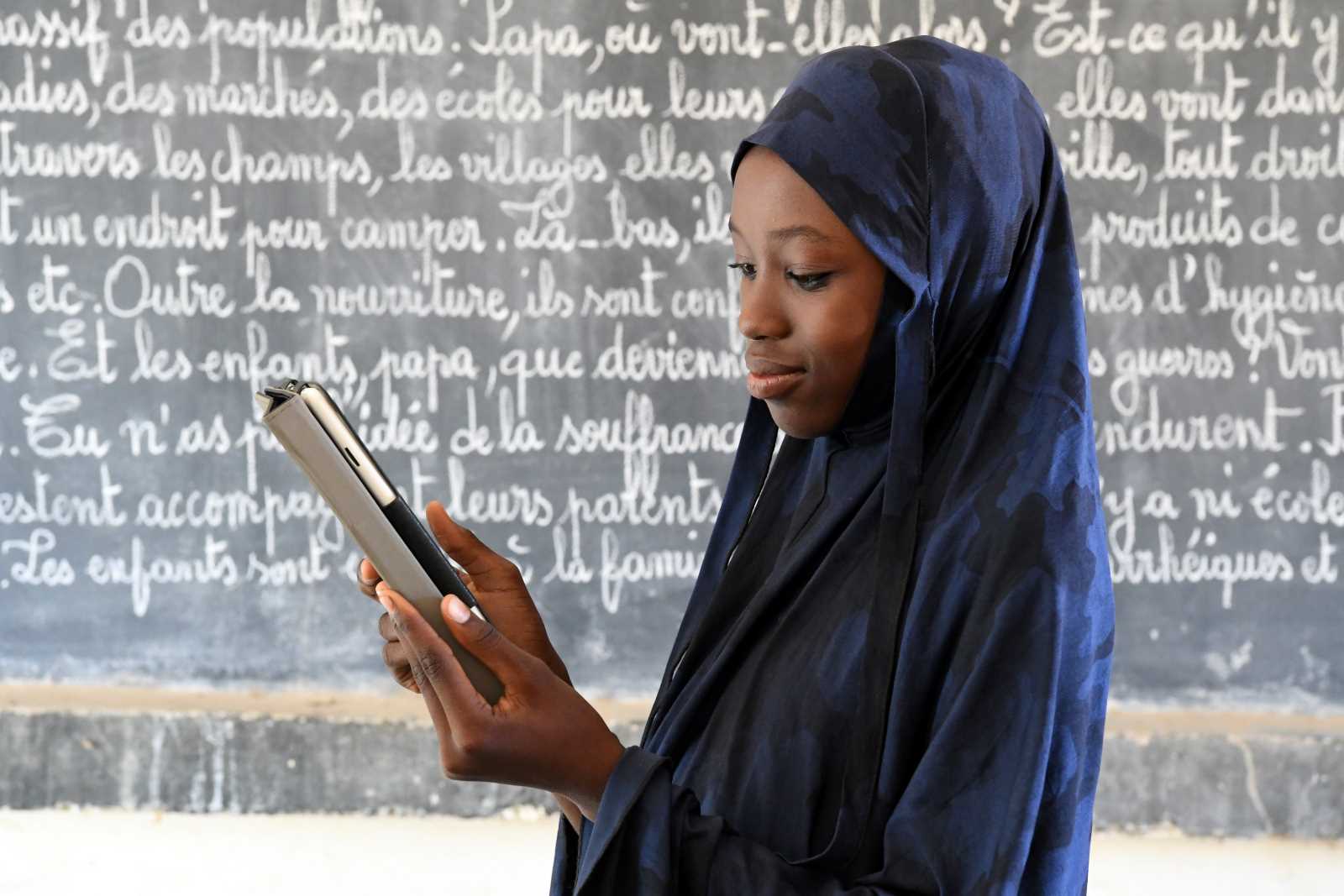Minorities
On the verge of disappearing

The Kalash language is classified as being severely endangered. An estimated 3,000 indigenous people who live in in the mountains of the Hindu Kush speak it. The language is the most important expression of a distinct indigenous group that has survived millennia and is still maintaining its rich and unique form.
The Kalash people have held on to their religious beliefs, along with their own identity, way of life and language. Hidden up in the mountains near Pakistan’s border with Afghanistan, the Kalash tribe loves homemade alcoholic drinks, celebrates and dances for days on festivals and worships a variety of gods. Women choose their husbands, which is otherwise rather unusual in Muslim-majority Pakistan.
The Kalash are blue eyed and fair skinned, so anthropologists, scientists and other authors wonder about their descent. The most popular claim is that this unique tribe has Greek roots. After all, Alexander the Great conquered these lands over 2000 years ago, so it seems convincing that the Kalash are descendants of his Greek troops. It is also concurred that the tribe shows signs, rites, history and possibly the DNA that traces back to the ancient Greeks. Another hypothesis, however, is that the Kalash is an Indo-Aryan tribe and may have arrived much earlier.
Surrounded by Muslim neighbours on all sides, the Kalash are the smallest ethnic group in Pakistan. Estimates vary, but census data suggest that their number has declined from 10,000 or so in the late 1950s to merely 3,000 today.
Kalash lifestyle and culture are very different from those of neighbouring Muslim communities. The Kalash celebrate three festivals in a year. These festivals are celebrated over homemade wine and dancing on the sound of drums. They worship several gods and spirits, making offerings and sacrifices during the festivals. These are also occasions where young women and men choose their husbands and wives.
Kalash women are not only allowed to choose their husbands, but they can also divorce them and are even allowed to elope. At the same time, Kalash women are burdened with superstitious beliefs. For example, menstruating women are said to be impure and hence to bring bad luck to the family if allowed to wander around. Women, during menstruation, are forced to stay in special compartments. All villages have them at some distance from the residential quarters. This is among the many traditions that make them different from other ethnic groups in Pakistan.
Kalash people also hold a unique tradition of funeral ceremonies. Death is mostly celebrated as a joyous occasion. It is believed that it is a union of the soul with the creator. Instead of mourning their dead, the Kalash give a farewell to the deceased by paying tributes with singing and beating drums. The dead are given food provisions for their final journey. Their possessions are laid besides them during the ceremony. These tributes last for days until the dead is put to his final resting place. In old times, the Kalash used to lay the body of the dead in a coffin anywhere in open, but with time they started burying their dead.
These ceremonies offer a chance to display wealth, showing the importance of the deceased and his or her family. However, the funerals of men tend to be more elaborate.
Tourist attraction
This unique and striking culture, though hidden in the mountains, has started attracting an increasing number of tourists. The Lowari Tunnel is making a big difference. This vehicular underpass is 10 kilometres long and links the districts of Chitral, where the Kalash live, with the district of Upper Dir. The tunnel was formally inaugurated in 2017. Better road access has led to an increase in local tourism. Moreover, modern supplies have become more readily available. The Kalash themselves, however, hardly benefit from related business as respective enterprises are controlled by non-Kalash people.
Discrimination against the Kalash runs deep. The 7.5 magnitude quake that struck parts of Northern Afghanistan and Pakistan in 2015, for instance, was blamed on Kalash community’s “immoral ways”. Many people argue that the Kalash should assimilate.
Their traditions are actually becoming extinct fast. One factor is conversions to Islam. This was already happening in colonial times as depicted by Rudyard Kipling in the short story “The man who would be king”. Insanity and idol worship figure in it prominently. The location is Kafiristan, which means the land of the infidels.
The subject of Kipling’s story were the “red Kafirs”, who were brutally converted at the end of the 19th century and were then called Nuristanis, the “enlightened ones.” In Kipling’s time, the Kalash, who live in the same region, were known as the “black Kafirs” because of typical black clothing. There have been media reports of forced conversions and of forced marriages with non-Kalash people. It is estimated that as many as 100 Kalasha have converted to Islam in the past few years.
Kalash culture is also being eroded from within. Young people are adapting to new and modern ways. Many want to get a formal education and have professional career. Lakshan Bibi was the first from her valley to graduate. She became a commercial airline pilot. Wazir Zada is the first Kalasha to become member of the Provincial Assembly of Khyber Pakhtunkhwa, which was formerly known as the Northwest Frontier Province.
Other issues that threaten the unique Kalash culture include illegal logging and land encroachment. This community is severely marginalised in economic terms. This is another reason why many Kalash people are abandoning their traditions, but they do not find acceptance in the dominant culture. If the course remains unchanged, only what is documented is likely to survive of their culture. It is therefore essential to record the customs and traditions that have been passed down orally. This knowledge is at risk and must not be lost.
Civil-society organisations have been campaigning to get the Kalash culture included in UNESCO’s Intangible Cultural Heritage List. The process was initiated in 2008, but has stalled since. Pakistan’s government has also been making efforts to protect and preserve the Kalash culture. The authorities worry that it is under threat rom exploitative tourism, which is set to get worse. The constitution ensures equal rights to minorities and the law is designed to safeguard Kalash customs, which has helped centuries-old practices to survive so far. What matters most, however, is that some Kalash people are determined to keep their traditions alive – and their resolve seems to be strengthening.
Mahwish Gul is from Islamabad and studies development management at Ruhr University Bochum and the University of Western Cape in Cape Town. Her masters’ programme belongs to AGEP, the German Association of Post-Graduate Programmes with Special Relevance to Developing Countries.
mahwish.gul@gmail.com














